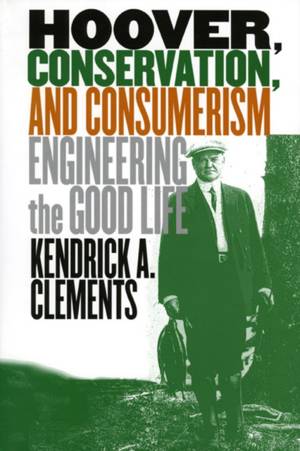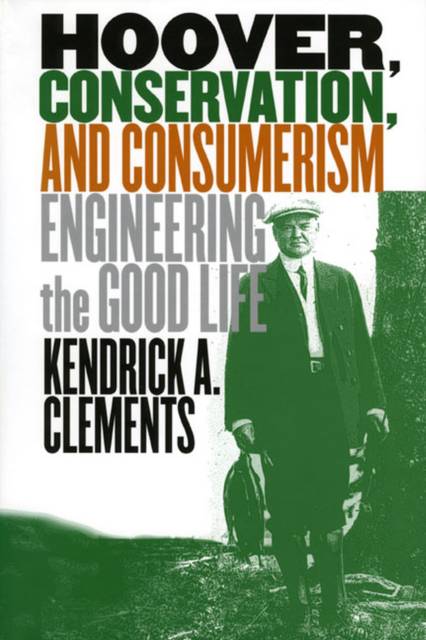
Bedankt voor het vertrouwen het afgelopen jaar! Om jou te bedanken bieden we GRATIS verzending (in België) aan op alles gedurende de hele maand januari.
- Afhalen na 1 uur in een winkel met voorraad
- In januari gratis thuislevering in België
- Ruim aanbod met 7 miljoen producten
Bedankt voor het vertrouwen het afgelopen jaar! Om jou te bedanken bieden we GRATIS verzending (in België) aan op alles gedurende de hele maand januari.
- Afhalen na 1 uur in een winkel met voorraad
- In januari gratis thuislevering in België
- Ruim aanbod met 7 miljoen producten
Zoeken
Hoover, Conservation, and Consumerism
Engineering the Good Life
Kendrick A Clements
Hardcover | Engels
€ 101,95
+ 203 punten
Omschrijving
Herbert Hoover rose to political leadership in the 1920s, just as consumer society became dominant in the United States. Although personally uncomfortable with the values of consumerism, he worked to strengthen the economy through policies of conservation and to find desirable occupations for the new leisure available to modern workers. He envisioned great voluntary programs to promote standardization and simplification in American industries that would permit companies to pay both high profits and high wages. And he sought opportunities for healthful, moral outdoor recreation to fill the leisure hours made possible by rising worker productivity. Kendrick Clements illuminates the influence of Hoover's broadly conceived ideas about conservation on virtually every economic policy of the Republican era, from the expansion of the National Park system by 40 percent to the attempt to eliminate radical swings in the business cycle. Locating the roots of Hoover's personal beliefs in his Quaker upbringing in Oregon and seeing his outlook on the natural world shaped by his frontier experience and education, Clements finds that this policy maker combined an interest in conserving the environment with an engineer's drive to rationalize the use of natural resources. He examines Hoover's difficult negotiation of the Colorado River Pact that permitted the construction of the dam that would bear his name as well as his efforts to create a St. Lawrence Waterway to link the Great Lakes to the Atlantic Ocean. Hoover's relief efforts during the 1927 Mississippi River flood and his promotion of timber and oil conservation reveal other dimensions of his approach to conservation. Although Hoover was not a modern environmentalist, he pioneered some of the first broad environmental policies in the United States. The National Conference on Outdoor Recreation brought together wilderness advocates and urban planners, passage of the first federal law to limit oil pollution in navigable waters began an ongoing effort to control the effects of industrialization, and his advocacy of pleasant, affordable housing introduced the idea that the world we live in every day is our most important environmental concern. In a period most often seen as a wasteland by historians who have viewed Republican environmental policies of the 1920s as mistaken, ineffective, or corrupt, Clements proposes that Hoover's conservation efforts were an attempt to balance growth and conservation. This unparalleled examination of early-twentieth-century conservation speaks to ongoing debates about how best to protect the environment without ruining the economy.
Specificaties
Betrokkenen
- Auteur(s):
- Uitgeverij:
Inhoud
- Aantal bladzijden:
- 352
- Taal:
- Engels
Eigenschappen
- Productcode (EAN):
- 9780700610334
- Verschijningsdatum:
- 27/01/2000
- Uitvoering:
- Hardcover
- Formaat:
- Genaaid
- Afmetingen:
- 152 mm x 229 mm
- Gewicht:
- 621 g

Alleen bij Standaard Boekhandel
+ 203 punten op je klantenkaart van Standaard Boekhandel
Beoordelingen
We publiceren alleen reviews die voldoen aan de voorwaarden voor reviews. Bekijk onze voorwaarden voor reviews.









